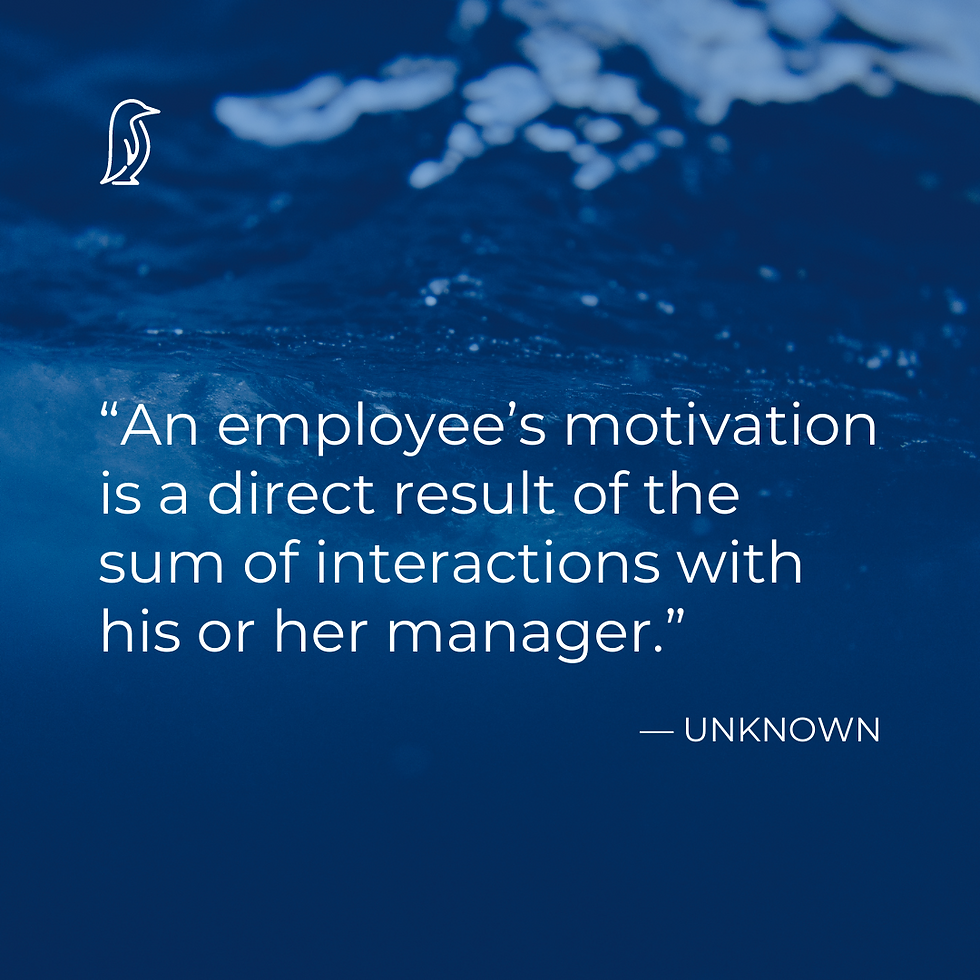Why Middle Managers Are Essential For Company And Employee Success

Table of Contents
Middle Managers as the Bridge Between Leadership and Employees
Middle managers act as a critical conduit, ensuring smooth communication and information flow throughout the organization. Their ability to effectively translate complex strategies and directives from upper management into actionable tasks for their teams is paramount.
Effective Communication and Information Flow
Effective management communication is at the heart of a successful organization. Middle managers excel at translating high-level strategic plans into clear, concise goals and tasks. This involves:
- Translating complex strategies into actionable tasks: Breaking down complex directives into manageable steps for team members.
- Gathering feedback from employees: Acting as a vital feedback mechanism, conveying employee concerns and suggestions to upper management.
- Identifying and escalating critical issues: Quickly identifying and addressing potential problems before they escalate, preventing disruptions and losses.
This two-way communication, encompassing both upward communication (from employees to management) and downward communication (from management to employees), is facilitated by strong middle managers who understand the importance of information dissemination throughout the organization.
Mentorship and Employee Development
Beyond communication, middle managers play a crucial role in employee development and mentorship. They are responsible for nurturing talent, boosting morale, and fostering a supportive work environment. This involves:
- Providing performance feedback: Regularly providing constructive feedback, both positive and negative, to help team members improve their performance.
- Identifying training needs: Recognizing skill gaps and advocating for relevant training and development opportunities for their teams.
- Fostering a supportive work environment: Creating a culture of collaboration, respect, and trust where employees feel valued and supported.
- Promoting career growth: Identifying high-potential employees and providing them with opportunities for advancement and professional development.
Strong mentorship programs, guided by effective middle managers, contribute significantly to employee retention and increased job satisfaction, leading to improved performance and leadership development within the organization.
Improving Operational Efficiency and Productivity
Middle managers are directly involved in the day-to-day operations of a company, playing a crucial role in improving operational efficiency and productivity. Their contributions extend from strategic implementation to boosting team morale.
Strategic Implementation and Goal Setting
Middle managers are responsible for translating high-level strategies into achievable goals and action plans for their teams. This requires strong project management skills and a keen understanding of resource allocation. Key aspects include:
- Project management: Overseeing multiple projects simultaneously, ensuring timely completion and adherence to budget.
- Resource allocation: Effectively allocating resources (personnel, budget, equipment) to maximize efficiency.
- Task delegation: Assigning tasks based on individual skills and expertise to optimize team productivity.
- Monitoring progress: Regularly tracking progress against targets and identifying potential roadblocks.
- Problem-solving: Quickly and effectively resolving issues that arise during project implementation.
This strategic execution and efficient resource management directly impacts the company's overall operational excellence and performance optimization.
Boosting Team Morale and Collaboration
A positive and productive work environment is crucial for achieving high performance. Middle managers play a vital role in fostering this environment by building strong teams and promoting collaboration. This involves:
- Team building activities: Organizing events and activities that foster team cohesion and camaraderie.
- Conflict resolution: Addressing conflicts fairly and effectively to prevent disruptions and maintain a positive work environment.
- Fostering collaboration: Encouraging teamwork and collaboration among team members to achieve shared goals.
- Creating a sense of community: Building a sense of belonging and purpose among team members.
- Recognizing accomplishments: Acknowledging and celebrating the achievements of individual team members and the team as a whole.
These team building strategies and effective conflict management significantly impact employee engagement and contribute to a more collaborative and productive workplace.
Driving Innovation and Adaptability
Middle managers are not simply executors of strategy; they are also vital in identifying opportunities for improvement and driving innovation within the organization.
Identifying Opportunities for Improvement
Middle managers have a unique vantage point, allowing them to identify areas for process improvement and innovation. They are in constant contact with employees and the day-to-day operations, offering valuable insights.
- Collecting employee feedback on processes: Gathering input from employees on ways to improve efficiency and effectiveness.
- Identifying bottlenecks: Pinpointing areas where processes are slowing down or causing inefficiencies.
- Suggesting innovative solutions: Proposing new ideas and approaches to improve processes and products.
- Championing change initiatives: Advocating for new ideas and helping to implement changes within their teams.
Implementing these innovative strategies and continuous improvement initiatives helps organizations stay ahead of the curve and maintain a competitive edge.
Adapting to Change and Uncertainty
The ability to adapt to change and uncertainty is crucial in today’s rapidly evolving business environment. Middle managers play a crucial role in helping their teams navigate change effectively. This includes:
- Communicating changes clearly: Ensuring that employees understand the reasons for change and how it will affect them.
- Addressing employee concerns: Providing a forum for employees to express their concerns and receive answers.
- Providing support and training: Offering the necessary support and training to help employees adapt to new processes and technologies.
- Adapting strategies as needed: Adjusting plans and strategies in response to changing circumstances.
These change management strategies ensure that teams remain resilient and adaptable, navigating uncertainty and maintaining productivity.
Conclusion
Middle managers are indispensable for both company and employee success. Their roles are multifaceted, bridging communication gaps, improving operational efficiency, driving innovation, and fostering employee development. They are the engine room of an organization, translating leadership’s vision into tangible results. Investing in your middle managers is investing in the future success of your company. Develop effective strategies to empower your middle managers and witness the positive impact on your organization's performance. Strong middle management is not just beneficial; it's essential for long-term growth and sustained success.

Featured Posts
-
 Press Conference Highlights Carneys Plan For Economic Transformation
May 06, 2025
Press Conference Highlights Carneys Plan For Economic Transformation
May 06, 2025 -
 Aritzia Addresses Trump Tariffs Impact And Pricing Strategy
May 06, 2025
Aritzia Addresses Trump Tariffs Impact And Pricing Strategy
May 06, 2025 -
 Open Ai 2024 Streamlined Voice Assistant Creation For Developers
May 06, 2025
Open Ai 2024 Streamlined Voice Assistant Creation For Developers
May 06, 2025 -
 Meet Greg Abel Warren Buffetts Chosen Successor And Future Of Berkshire Hathaway
May 06, 2025
Meet Greg Abel Warren Buffetts Chosen Successor And Future Of Berkshire Hathaway
May 06, 2025 -
 How Margin Pressure Is Affecting Westpacs Wbc Bottom Line
May 06, 2025
How Margin Pressure Is Affecting Westpacs Wbc Bottom Line
May 06, 2025
Latest Posts
-
 Patrick Schwarzeneggers Unseen Superman Audition
May 06, 2025
Patrick Schwarzeneggers Unseen Superman Audition
May 06, 2025 -
 The Superman Race Patrick Schwarzeneggers Near Miss
May 06, 2025
The Superman Race Patrick Schwarzeneggers Near Miss
May 06, 2025 -
 Patrick Schwarzenegger Reflects On Failed Superman Audition
May 06, 2025
Patrick Schwarzenegger Reflects On Failed Superman Audition
May 06, 2025 -
 Schwarzenegger On Superman The Audition That Didnt Fly
May 06, 2025
Schwarzenegger On Superman The Audition That Didnt Fly
May 06, 2025 -
 Patrick Schwarzeneggers Rejected Superman Audition What Happened
May 06, 2025
Patrick Schwarzeneggers Rejected Superman Audition What Happened
May 06, 2025
